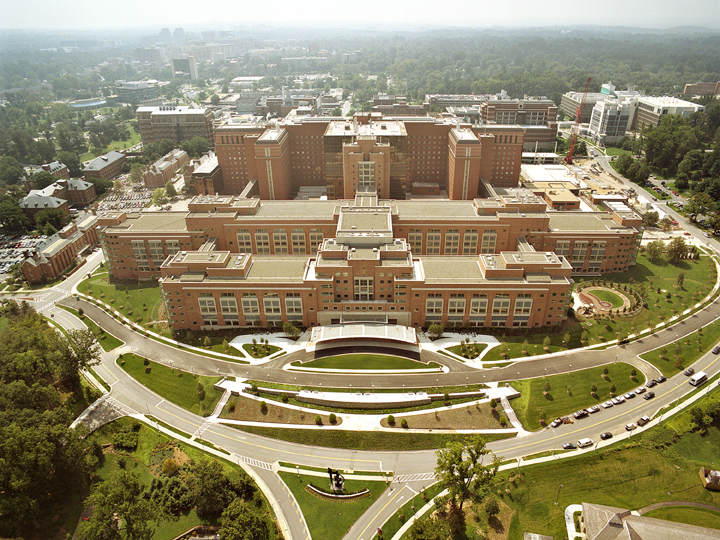
NIH Clinical Research Center
An estimated $5.8 billion in cuts to the National Institutes of Health in President Donald Trump’s proposed budget has California’s top universities and medical institutions sounding the alarm.
Trump’s spending plan — running into opposition from Republicans and Democrats alike — would cut about 20 percent of the roughly $30 billion budget of the nation’s medical research agency that supports research on cancer, Alzheimer’s disease, Zika and other conditions.
Research institutions nationwide decried the cuts as potentially devastating to their work.
Among those who stand to lose the most are the University of California, San Francisco, which for the past three years has received more in NIH biomedical grants than any other public university in the country.
Grants to UCSF’s four schools that tailor to health professions reached nearly $634 million in fiscal year 2016, according to the UC Office of the President.
“It’s tremendously shocking,” said Keith Yamamoto, UCSF’s vice chancellor for science policy and strategy.
Research institutions nationwide decried the cuts as potentially devastating to their work.
Among those who stand to lose the most are the University of California, San Francisco, which for the past three years has received more in NIH biomedical grants than any other public university in the country.
Grants to UCSF’s four schools that tailor to health professions reached nearly $634 million in fiscal year 2016, according to the UC Office of the President.
“It’s tremendously shocking,” said Keith Yamamoto, UCSF’s vice chancellor for science policy and strategy.
“The hope was that biomedical research would fare well,” even in the face of the administration’s stated desire to control spending, said Yamamoto, a top researcher in cellular and molecular pharmacology.
Total NIH funding for the University of California system in the 2016 fiscal year reached nearly $2 billion.
At Johns Hopkins University, the institution receiving the most in NIH grants last year, an official described the potential budget cuts as “extraordinarily threatening.” Johns Hopkins received about $651 million in NIH grants.
Officials at Harvard University, Fred Hutchinson Cancer Research Center in Seattle and the University of Alabama at Birmingham voiced similar concerns, noting that the cuts could set back basic scientific research that has led to lifesaving medical treatment.
Based in Bethesda, Md., the NIH spends most of its annual budget — about 85 percent — on grants to thousands of researchers and medical institutions across the country.
Traditionally, biomedical research has enjoyed strong bipartisan support, surviving ideologically driven cutbacks from one administration to the next. Grant increases to major NIH recipients had been averaging about 3 percent per year during the Obama administration.
NIH officials declined to comment on Trump’s budget blueprint, but its parent agency, the U.S. Department of Health and Human Services, released a statement saying the agency is “dedicated to fulfilling our department’s mission to improve the health and well-being of the American people.”
The officials said the budget supports that mission and will help ensure delivery of critical services “in the most efficient and effective manner possible.”
Congressional Democrats are already pushing back hard against Trump’s fiscal plan, as are some Republicans. Political observers caution that presidents’ budget proposals, while signaling administration priorities, rarely are approved by Congress without major changes.
Still, UCSF’s Yamamoto said, “research laboratories run like small businesses that operate on a very tight margin. There’s no slack in any element of it.”
The results of double-digit funding cuts, he said, “would be dramatic and immediate and disastrous.”
UCSF Chancellor Sam Hawgood slammed the cuts as “deeply disturbing,” calling the NIH and the research it supports “the envy of the world.” As a public institution, UCSF has honored “a pact with taxpayers by conducting research that has improved the health of all Americans,” Hawgood said.
Federal money for research, in addition to finding cures for disease, also stimulates job creation, with grant dollars being paid back many times over, Hawgood said.
“Nearly 200 startup companies have been launched based on UCSF research,” Hawgood said. “Those companies now offer good jobs and generate tax revenues that bolster the American economy.”
The entire UC system benefits from NIH support, with UC, San Diego, winning more than $414 million in competitive grants last year — placing it squarely among the agency’s top 10 recipients. UC President Janet Napolitano issued a statement decrying the proposed budget cuts, saying they would “stifle crucial advancements toward solving our nation’s most pressing needs and challenges.”
Last year, Stanford University ranked among the top 10 grant recipients, receiving 944 grants for a total of more than $427 million, according to NIH data.
University officials noted that it is still “very early in the budget process,” but said in a statement it was clear that the proposed cuts would harm research in medicine and health, technology, the environment, the humanities, social sciences and many other fields.
In a press briefing Thursday, Mick Mulvaney, the director of the Office of Management and Budget, supported a major reorganization of NIH, calling for a consolidation of the agency’s 27 different institutes and centers with a “focus on efficiencies.” According to Mulvaney, the agency had been subject to “mission creep,” expanding “beyond their core functions.”
This article was reprinted from kaiserhealthnews.org with permission from the Henry J. Kaiser Family Foundation. Kaiser Health News, an editorially independent news service, is a program of the Kaiser Family Foundation, a nonpartisan health care policy research organization unaffiliated with Kaiser Permanente.












